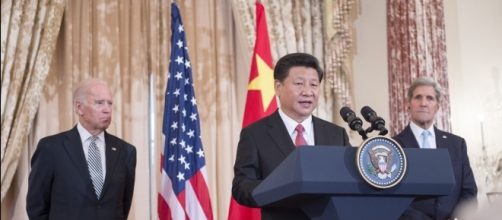President Obama, despite not having the support of the senate, will sign and ratify the Paris Climate Agreement this Friday, a Chinese news outlet is reporting. The news has set off alarm bells among opponents of the climate change accord, which calls for nations to reduce greenhouse gas emissions to avert warming 1.5 degrees Celsius. Republicans have insisted that the pact is a treaty and must be ratified by the senate, as laid out in the U.S. constitution.
Obama and Chinese President Xi Jinping are planning to announce their joint ratification of the accord two days before the G-20 Summit begins on Sunday, September 4, in Hangzhou, Zhejiang.
The Post also writes that “senior climate officials” from both governments have been working “late into the night” in Beijing to finalize the details. As climate change experts have noted, averting warming by 1.5 degrees won’t occur without a complete power shutdown of all greenhouse-emitting sources, which would send the world into a new stone age.
US and China to jointly announce ratification of Paris #climate deal before G20, according to Chinese press https://t.co/c6gJGYeuNj
— Zachary Davies Boren (@zdboren) August 25, 2016
Obama’s second-term dictatorship?
In the United States, only the senate can ratify treaties via a two-thirds vote. In communist China, however, a treaty only requires its leader to say, “So be it.” That’s according to Myron Ebell, the energy and environmental director at the free-market Competitive Enterprise Institute (CEI), who said Obama is ratifying a treaty the same way China’s communist dictator is doing it: by saying three magic words, “So be it.” Prior to being elected a second time, Obama repeatedly said he was not an emperor and he can’t wave a magic wand and do whatever he pleases.
That changed in his final term.
Senator James Inhofe (R-OK), chairman of the Senate’s Environment Committee, has cautioned other countries that without senate ratification, the Paris climate accord would be dead in the water. Inhofe said in April that he wanted to make sure international participants knew President Obama was going rogue and didn’t have the support of his own government. As such, Inhofe said, the pact will fail. Obama’s Clean Power Plan, part of this climate treaty, has been put on hold by the Supreme Court while 29 states and industry groups have time to litigate its legality.
U.N. urging Obama, China
U.N. Secretary-General Ban Ki-moon has asked top emitters like the U.S. and China to accelerate the process of ratifying the accord after countries were slow to do it.
Currently, China, the United States, the EU, and India are the top greenhouse gas emitters. The climate accord can only move forward if 55 nations representing at least 55 percent of global emissions ratify the agreement. Only 23 nations that cover roughly 1.08 percent of emissions have actually ratified the pact. Signing the accord is the first stage before ratification.
Accountability is cool and this tracker let's you see where countries are re: Paris agreement ratification #COP21 https://t.co/7LJk3qD7Mp
— Emile Lavergne (@e_lava) April 16, 2016
India said in June it is reticent of ratifying such an agreement as it would seriously hinder its own country’s economic development. If the U.S. and China sign and ratify the climate accord, that would mean 39 percent of global emissions and 26 more countries would be needed to make it official, according to CAIT Climate Data Explorer, which has also been tracking the accord’s progress.
#ModiinUS #India Contradicts US Claim Over Signing Climate Deal This Year https://t.co/dDaAwPFGsr pic.twitter.com/rTZN6WJfgz
— News World India (@NewsWorldIN) June 8, 2016
Secretary of State John Kerry was adamant the Paris Climate Agreement did not contain the word treaty, as that would trigger the senate’s approval. Republicans dispute Kerry’s vernacular embellishments because once the pact is ratified, it would require legally binding targets be set by the United States. This is part of the regulatory regime Obama created with a “pen and a phone,” which many financial experts believe is behind the country’s long-running, stagnant GDP, the worst it’s been since 1949. Republican presidential candidate Donald Trump has warned he would renegotiate the treaty or toss it out, while Hillary Clinton said she would expand its scope.

